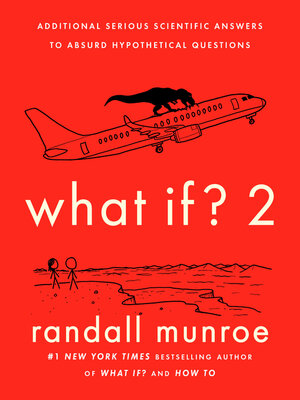What If? 2
ebook ∣ Additional Serious Scientific Answers to Absurd Hypothetical Questions
By Randall Munroe

Sign up to save your library
With an OverDrive account, you can save your favorite libraries for at-a-glance information about availability. Find out more about OverDrive accounts.
Find this title in Libby, the library reading app by OverDrive.



Search for a digital library with this title
Title found at these libraries:
| Loading... |
AN INSTANT NEW YORK TIMES BESTSELLER!
An NPR Best Book of 2022
"The questions throughout What If? 2 are equal parts brilliant, gross, and wonderfully absurd and the answers are thorough, deeply researched, and great fun. . . . Science isn’t easy, but in Munroe’s capable hands, it surely can be fun." —TIME
The #1 New York Times bestselling author of What If? and How To answers more of the weirdest questions you never thought to ask
The millions of people around the world who read and loved What If? still have questions, and those questions are getting stranger. Thank goodness xkcd creator Randall Munroe is here to help. Planning to ride a fire pole from the Moon back to Earth? The hardest part is sticking the landing. Hoping to cool the atmosphere by opening everyone’s freezer door at the same time? Maybe it’s time for a brief introduction to thermodynamics. Want to know what would happen if you rode a helicopter blade, built a billion-story building, made a lava lamp out of lava, or jumped on a geyser as it erupted? Okay, if you insist.
Before you go on a cosmic road trip, feed the residents of New York City to a T. rex, or fill every church with bananas, be sure to consult this practical guide for impractical ideas. Unfazed by absurdity, Munroe consults the latest research on everything from swing-set physics to airliner catapult–design to answer his readers’ questions, clearly and concisely, with illuminating and occasionally terrifying illustrations. As he consistently demonstrates, you can learn a lot from examining how the world might work in very specific extreme circumstances.
An NPR Best Book of 2022
"The questions throughout What If? 2 are equal parts brilliant, gross, and wonderfully absurd and the answers are thorough, deeply researched, and great fun. . . . Science isn’t easy, but in Munroe’s capable hands, it surely can be fun." —TIME
The #1 New York Times bestselling author of What If? and How To answers more of the weirdest questions you never thought to ask
The millions of people around the world who read and loved What If? still have questions, and those questions are getting stranger. Thank goodness xkcd creator Randall Munroe is here to help. Planning to ride a fire pole from the Moon back to Earth? The hardest part is sticking the landing. Hoping to cool the atmosphere by opening everyone’s freezer door at the same time? Maybe it’s time for a brief introduction to thermodynamics. Want to know what would happen if you rode a helicopter blade, built a billion-story building, made a lava lamp out of lava, or jumped on a geyser as it erupted? Okay, if you insist.
Before you go on a cosmic road trip, feed the residents of New York City to a T. rex, or fill every church with bananas, be sure to consult this practical guide for impractical ideas. Unfazed by absurdity, Munroe consults the latest research on everything from swing-set physics to airliner catapult–design to answer his readers’ questions, clearly and concisely, with illuminating and occasionally terrifying illustrations. As he consistently demonstrates, you can learn a lot from examining how the world might work in very specific extreme circumstances.







